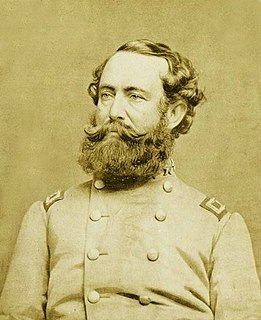
Wade Hampton III was a Confederate States of America military officer during the American Civil War and politician from South Carolina. He came from a wealthy planter family, and shortly before the war he was one of the largest slaveholders in the Southeast as well as a state legislator. During the American Civil War, he served in the Confederate cavalry, where he reached the rank of lieutenant general.
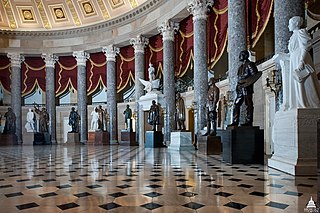
The National Statuary Hall is a chamber in the United States Capitol devoted to sculptures of prominent Americans. The hall, also known as the Old Hall of the House, is a large, two-story, semicircular room with a second story gallery along the curved perimeter. It is located immediately south of the Rotunda. The meeting place of the U.S. House of Representatives for nearly 50 years (1807–1857), after a few years of disuse in 1864 it was repurposed as a statuary hall; this is when the National Statuary Hall Collection was established. By 1933 the collection had outgrown this single room, and a number of statues are placed elsewhere within the Capitol.
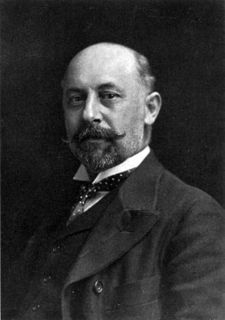
Frederick Wellington Ruckstull, German: Friedrich Ruckstuhl was a French-born American sculptor and art critic.

The National Statuary Hall Collection in the United States Capitol is composed of statues donated by individual states to honor persons notable in their history. Limited to two statues per state, the collection was originally set up in the old Hall of the House of Representatives, which was then renamed National Statuary Hall. The expanding collection has since been spread throughout the Capitol and its Visitor's Center.

The South Carolina State House is the building housing the government of the U.S. state of South Carolina, which includes the South Carolina General Assembly and the offices of the Governor and Lieutenant Governor of South Carolina. Located in the capital city of Columbia near the corner of Gervais and Assembly Streets, the building also housed the Supreme Court until 1971.
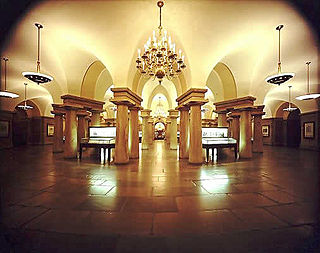
The United States Capitol crypt is the large circular room filled with forty neoclassical Doric columns directly beneath the United States Capitol rotunda. It was built originally to support the rotunda as well as offer an entrance to Washington's Tomb. It currently serves as a museum and a repository for thirteen statues of the National Statuary Hall Collection.
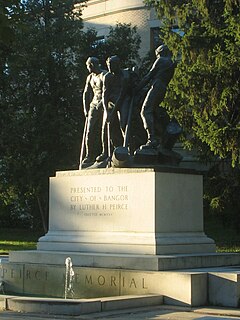
Charles Eugene Tefft was an American sculptor born in Brewer, Maine. His statue of Hannibal Hamlin is one of Maine's two statues in the National Statuary Hall Collection located in the US Capitol in Washington D.C.. A second Tefft statue of Hamlin stands in Norumbega Mall in downtown Bangor, Maine.

James Paul Clarke is a marble sculpture depicting the American politician of the same name by Pompeo Coppini, installed in the United States Capitol's National Statuary Hall Collection, in Washington, D.C., as one of two statues gifted by the U.S. state of Arkansas. The 6 foot 10 inch tall statue was placed in the Hall in 1921. The work cost $7,500. and was unveiled in Washington in 1921.

John C. Calhoun is a marble sculpture depicting the American statesman of the same name by Frederick Ruckstull, installed in the United States Capitol's crypt, in Washington, D.C., as part of the National Statuary Hall Collection. The statue was gifted by the U.S. state of South Carolina in 1910.

Jacob Collamer is a marble statue of Jacob Collamer by Preston Powers, installed in the United States Capitol, in Washington D.C., as part of the National Statuary Hall Collection. It is one of two statues donated by the state of Vermont. The statue was accepted in the collection by Alexander H. Stephens in 1881.
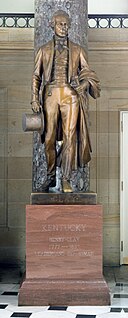
Henry Clay is a 1929 bronze sculpture by Charles Henry Niehaus depicting the lawyer and politician Henry Clay, installed in the United States Capitol in Washington D.C. as part of the National Statuary Hall Collection. It is one of two statues donated by the state of Kentucky. The statue was accepted into the collection by Virgil Chapman on March 3, 1929.

John M. Clayton is a 1934 marble sculpture depicting the American lawyer and politician of the same name by Bryant Baker, installed in the United States Capitol, in Washington D.C., as part of the National Statuary Hall Collection. It is one of two statues donated by the state of Delaware The statue was accepted in the collection by Robert G. Houston on June 6, 1934.

Philip Kearny is an 1888 bronze sculpture of Philip Kearny by Henry Kirke Brown, installed in the United States Capitol, in Washington, D.C., as part of the National Statuary Hall Collection. It is one of two statues donated by the state of New Jersey.

Andrew Jackson is a 1928 bronze sculpture of Andrew Jackson by Belle Kinney Scholz and Leopold Scholz, installed in the United States Capitol, in Washington D.C., as part of the National Statuary Hall Collection. It is one of two statues donated by the state of Tennessee. The statue was accepted into the collection by Senator Kenneth McKellar on April 16, 1928.

Robert M. La Follette Sr. is a 1929 marble sculpture of Robert M. La Follette by Jo Davidson, installed in the United States Capitol, in Washington, D.C., as part of the National Statuary Hall Collection. It is one of two statues donated by the state of Wisconsin. The statue was accepted in the collection by Senator John J. Blaine on April 25, 1929.

Oliver P. Morton is a 1900 marble statue of Governor Oliver P. Morton by Charles Henry Niehaus installed in the United States Capitol, in Washington, D.C., as part of the National Statuary Hall Collection. It is one of two statues donated by the state of Indiana. The statue was accepted into the collection on April 14, 1900 by Indiana Senator Albert J. Beveridge.,

Julius Sterling Morton, also known as J. Sterling Morton, is a 1937 bronze sculpture of Julius Sterling Morton by Rudulph Evans, installed in the United States Capitol Visitor Center, in Washington, D.C., as part of the National Statuary Hall Collection. It is one of two statues donated by the state of Nebraska. The sculpture was accepted into the collection by Congressman Karl Stefan of Nebraska on April 27, 1937.
James Shields is an 1893 bronze sculpture of James Shields by Leonard Volk, installed in the United States Capitol, in Washington, D.C., as part of the National Statuary Hall Collection. It is one of two statues donated by the state of Illinois. The sculpture was unveiled by Senator Shelby Moore Cullom of Illinois on December 6, 1893.

Uriah M. Rose, or Uriah Milton Rose, is a marble sculpture depicting the American lawyer of the same name by Frederick Ruckstull, installed in the United States Capitol's National Statuary Hall, in Washington, D.C., as part of the National Statuary Hall Collection. The statue was gifted by the U.S. state of Arkansas in 1917.

There are several works of art in the United States Capitol honoring former leaders of the Confederate States of America and generals in the Confederate States Army, including eight statues in the National Statuary Hall Collection, busts and portraits.


















